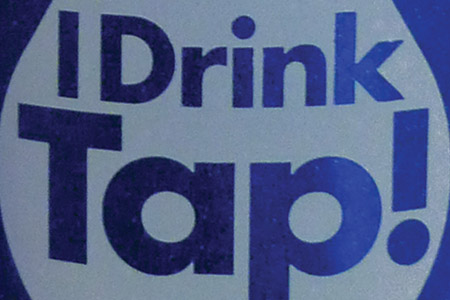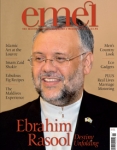
Sustainable Solutions
Issue 98 November 2012
In its bid to make a difference, MADE in Europe has launched two campaigns to promote sustainable living. One encourages people to stop drinking bottled water, and the other promotes fair trade.
I Drink Tap!
The Prophet Muhammad said, “Do not withhold excess water, preventing others from pasturing from it.” MADE in Europe’s ‘ I Drink Tap!’ campaign encourages Muslim communities to give up wasteful and environmentally harmful bottled water and raises awareness about its damaging effects. High consumer demand for bottled water has had a heavy and unnecessary impact on our environment and the developing world in recent years, exacerbating climate change and adding to the long-term causes behind the global food shortage affecting one billion people. Yet the demand for bottled water has increased manifold in the last few years.
The problem is that most bottled water comes in plastic bottles, which uses crude oil in the manufacturing process, depleting non-renewable energy sources. In fact, a large amount of water is used in the manufacturing and bottling process, and for every litre of water that goes into the bottle, two litres are wasted during production. And although most plastic water bottles are recyclable, only 20% actually get recycled. The growth in demand for bottled water has created water shortages for farmers worldwide as large multinationals continue to privatise public water sources.
We as Muslims are duty bound to conserve the resources provided to us and ensure they are fairly distributed. Water is arguably one of the most valuable resources on earth, and must be used wisely and treated as a great blessing.
Yet, not only has the Muslim community lagged behind in efforts to curb the use of bottled water, it has actively promoted its use. The problem is especially worse during Ramadan and Hajj. During Ramadan, mosques and community centres hand out thousands of water bottles during iftar and taraweeh, and many Muslim charities will hand them out to raise their profile. At Hajj, pilgrims leave behind as many as 100 million plastic bottles.
While we do not expect bottled water to completely disappear, it is important to highlight its economic, environmental and social costs. Our message is simple: water is a gift from God, and bottled water is an injustice to fellow humans and our planet. ‘I Drink Tap!’ aims to not only promote the use of tap water instead of bottled water, but also to promote the ideas of environmental responsibility and sustainable living in the Muslim community.
Fair Trade
“Give full measure and full weight in justice, and wrong not people in respect of their goods.” (Qur’an 11:85) We live in an economically unjust world where even as food prices soar, farmers in the developing world rarely reap the just rewards for their efforts. While they already suffer due to antiquated agricultural practices and poor access to markets, global trade rules also tend to disadvantage them in favour of multinationals and big traders. This leaves them struggling to pay for essentials such as food, school and healthcare and means they are unable to break the cycle of debt and poverty.
Bookmark this |
|
Add to DIGG |
|
Add to del.icio.us |
|
Stumble this |
|
Share on Facebook |
|
Share this |
|
Send to a Friend |
|
Link to this |
|
Printer Friendly |
|
Print in plain text |
|


Comments
2 Comments
1
how to get a six pack
18 Feb 13, 13:31
Often, enforcement and monitoring of water quality is uneven and irregular for both tap water and bottled water. While tap water contamination incidents must be reported promptly to the public, the same is not true for bottled water, and while contamination of bottled water does occur, many instances have never received public notice until recently.
2
fighting acne
18 Feb 13, 07:52
Over large parts of the world, humans have inadequate access to potable water and use sources contaminated with disease vectors, pathogens or unacceptable levels of toxins or suspended solids. Drinking or using such water in food preparation leads to widespread acute and chronic illnesses and is a major cause of death and misery in many countries.